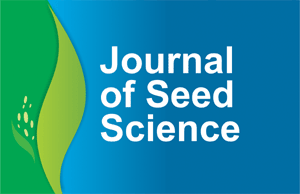Bipolaris oryzae and Gerlachia oryzae, which cause rice brown spot and leaf scald, respectively, are mainly disseminated by seeds. The aim of this study was to evaluate the potential of seeds microbiolization to reduce transmission of these pathogens to seedlings by using the bacteria DFs185 (Pseudomonas synxantha), DFs223 (P. fluorescens), DFs306 (unidentified) and DFs418 (Bacillus sp.). Seeds naturally infested/infected with both pathogens were immersed in suspension of these bacteria (A540 = 0.5) individually or in saline solution (control treatment). After 30 minutes of agitation at 10 ºC, 400 seeds were submitted to a sanity test through the blotter method and the isolate DFs223 was the best to reduce the incidence of B. oryzae and G. oryzae in both seed lots evaluated. Seeds treated like above were sowed in sterilized vermiculite. Seed transmission and growth promotion were recorded after 21 days of incubation in the same conditions. The isolates DFs185 and DFs306 reduced transmission of both pathogens, although the isolate DFs306 was the one wich gave the greatest growth increases. The evaluation of the in vitro antibiosis showed that isolates inhibited the mycelial growth of both pathogens, except DFs306. It is possible to affirm that these bacteria have the potential to be used as a seed treatment for seed-borne disease control.
biological control; rice brown spot; rice leaf scald; seed treatment; Oryza sativa L
